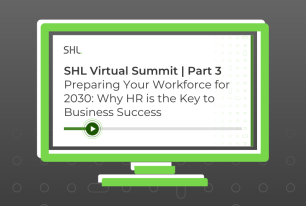The 4 Reasons You Should Embrace a Skills-Based Hiring Approach for 2023 and Beyond
Why the key to creating agile, evidence-backed hiring systems requires a skills-based hiring approach.
Share
Recently I had the privilege of facilitating several roundtable conversations with talent acquisition leaders from Fortune 500 powerhouse organizations like Mastercard, Nationwide, Honeywell, Sutherland, PayPal, and others. It was a thrill to share best practices and explore the many successes (and some failures) that have led to meaningful Talent Acquisition (TA) growth and maturity within some of the most respected HR teams in the world. In addition to walking away from these conversations energized about the future of recruiting, I was more convinced than ever that the key to creating agile, evidence-backed hiring systems requires a skills-based hiring approach. There are 4 critical reasons why skills are the future of hiring:
- The future of work
- The emergence of potential
- The power of DE&I
- The criticality of talent intelligence
The Future of Work
Job changes are happening faster than ever. We are seeing revolutionary advances in Artificial Intelligence (AI) and automation dramatically affecting how work is accomplished. Crowdsourcing and gig workers are changing the nature of who does work. And flexible, hybrid and remote working has significantly altered when and where work is done for millions of employees. These monumental shifts in the very nature of work have dramatically altered the skills that allow employees to survive and thrive. Forward-thinking TA leaders are taking this opportunity to build stronger partnerships with internal business stakeholders, leading the effort to understand and document the emerging skills that will enable business success in the digital age. So, dust off those old job descriptions and more importantly, anchor and structure your conversations with internal stakeholders around the emerging skills profile that will be needed as the business evolves.
The Emergence of Potential
With the future of work becoming more volatile and ever-changing, the evaluation of candidates against a narrow view of job-specific requirements is becoming less helpful. While specific knowledge, experience, or key skills that allow new hires to be successful quickly is still important, the qualities that allow individuals to thrive in a rapidly changing business landscape are also needed. Skills like adaptability, resilience, learning potential and flexibility are key! The good news is candidates are begging for the opportunity to broadly demonstrate their skills and interests, and they are motivated by organizations that take real action in their ongoing development. According to Qualtrics, job seekers are willing to forego up to 12% of their salary in exchange for growth and development opportunities. A skills-based hiring model allows you to capture the skills that inform a candidate’s readiness to be successful today, while also exploring their potential for an uncertain tomorrow.
According to Qualtrics, job seekers are willing to forego up to 12% of their salary in exchange for growth and development opportunities.
The Power of DE&I
With talent markets being so competitive and the future of work so uncertain, the need to embrace and engage new talent pools has never been greater. Research shows that employees from different backgrounds and perspectives contribute toward innovation, new perspectives, thought processes, and problem-solving skills. When designing hiring strategies our goal should be to place less emphasis and priority on education and CV qualifications that tend to simply reinforce hiring decisions that are status quo. If the goal is to engage new and different talent pools, we still need to isolate hiring criteria that help us identify the best candidates. And skills provide a much better, more inclusive, and fairer way to identify great talent from all types of backgrounds and experiences.
The Criticality of Talent Intelligence
My roundtable conversations reminded me of the importance of maturing the talent acquisition function with data-driven insights and analytics. “Run the TA function in a manner that would make your CFO proud” was a comment shared by one of the forward-thinking leaders on the panel. At SHL, we have found that skills intelligence is among the most usable and powerful talent data you can collect in today’s climate. Organizations are building “skills hubs” including skills data, technology, and governance to power strategic decisions and drive mobility and agility. Unfortunately, only 33% of companies have a single source of skills data across the company yet 70% of executives say talent analytics is a top priority.
While talent assessments have long been used to increase hiring efficiency and drive quality of hire, they now serve as a critical tool to funnel into the organization the skills needed to accelerate your talent-led digital transformation. Align objective assessment data against your critical skills of the future, discover those hidden gem candidates with the skills and potential to thrive in your changing business context, finally make progress against your important DEI goals, and build a skills-based talent dataset to create a lasting competitive advantage. As one of my astute roundtable panelists shared at the close of our session – “we live in a skills world, it’s up to us to adapt”.
Partner with SHL in your Volume Hiring strategy to identify best-fit candidates with the perfect balance of skills ready for roles today and potential for the future.










